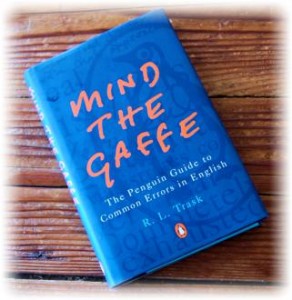 Shortly before she died, a writer friend gave me a copy of R L Trask’s Mind the Gaffe: The Penguin Guide to Common Errors in English.
Shortly before she died, a writer friend gave me a copy of R L Trask’s Mind the Gaffe: The Penguin Guide to Common Errors in English.
‘I think that you and Larry will get on very well,’ my friend said.
‘Oh? Why is that?’
‘Well, even though he’s an academic, when it comes to written English he seems to have a strong dislike of both empty waffle and starchy pomposity.’
Mind the Gaffe is intended as a reference book. The entries are arranged alphabetically, starting with a guide to when to use a and when to use an, and continuing on for another 293 pages until it arrives at a note on words ending in -yse (British English) and words ending in -yze (American English).
For the past twelve or so years, this handy blue-covered volume has sat on my desk, along with The Concise Oxford Dictionary and The New Fowler’s Modern English Usage. And seldom does a week pass without me dipping into it for clarification of some point or other. What is the difference between dissent and dissension? When is it preferable to use lengthy rather than long? And what is the currently preferred spelling of yogurt/yoghurt/yoghourt? (According to Professor Trask, it’s yogurt.)
This summer, Mind the Gaffe has also been one of my most satisfying holiday reads. Over a couple of days, I read it from cover to cover (accompanied by the occasional glass of chilled rosé). I can thoroughly recommend it.
